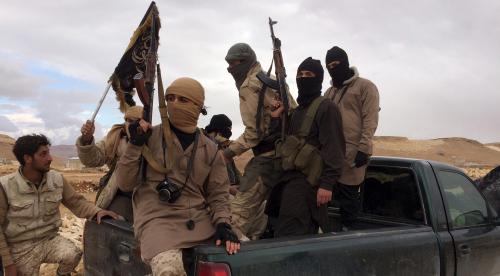Terrorist groups don’t emerge out of nowhere, and wars are perhaps the richest soil for seeding and growing violent groups of all stripes, writes Dan Byman. This post originally appeared in the Washington Post.
Study after study has found no common profile of a terrorist. It is hard to explain why, say, almost four times as many recruits leave Sweden to fight with the Islamic State as from neighboring Norway, though Sweden’s population is only twice Norway’s. Pundits and politicians alike speculate on why individuals might embrace terrorism, but such a question risks missing one obvious point: Having a terrorist group around in the first place is one of the most important factors in influencing an individual’s choice to join.
Terrorist groups don’t emerge out of nowhere, and wars are perhaps the richest soil for seeding and growing violent groups of all stripes. Without the wars in the Middle East there would be no Islamic State, and it is not the only one: al-Qaida, Hezbollah, and other extremist groups all emerged out of regional civil wars. The formation of such groups is a political phenomenon, and so, too, is the radicalization of foreign fighters from the West.
Terrorist groups are rarely the cause of civil wars. Iraq’s civil war began in 2003 after the U.S. invasion and occupation; Syria’s civil war began with peaceful protests against a brutal dictator in 2011; and Libya’s strife came after a terrorist-supporting dictator was toppled in the same year.
Rather, such wars beget and foster terrorism in several ways. Terror itself is often a tool in war, used to sow an atmosphere of fear and undermine governments. Assassinations of rival political leaders, bombs for police and military recruits and random violence against civilians—these are all methods learned from Insurgency 101.
Groups such as al-Qaida and now the Islamic State exploit new wars wherever they can. Terrorist groups linked to civil wars seek supporters in the United States, Europe, and other areas outside the theater for reasons both obvious and obscure—and these factors generate more terrorists. This pull is especially strong when identities cross borders—as does a religious identity like Islam—and when local ties are weak or the community as a whole is poorly integrated, as the Muslim community is in many European countries.
Foreigners might join these groups for altruistic reasons, to help the genuinely oppressed (the Syrian people facing Bashar al-Assad, or the Afghans facing the Soviets). Yet often the oppression is a myth, or at least greatly exaggerated: One powerful narrative of the Islamic State is that Sunni Muslims are facing a global Shiite conspiracy led by Iran and Hezbollah.
Still others join because they are true believers and want to live the dream. In different ways, the war takes them out of their humdrum or depressing present, giving them a new life: “I’m the most content I have ever been in my life,” tweeted one young American woman who had gone to live in the Islamic State, ending the tweet with a heart emoji. Many are merely thugs who spent time in jail or otherwise led delinquent lives: Joining the Islamic State or a similar group gives them a license to kill and torture.
Because there is no single profile, terrorist groups such as the Islamic State seek to appeal to many different ones. Propaganda stresses the good life in the caliphate, the glory of fighting for God, the oppression the community is facing, and glorified ultra-violence. Religion matters, but only as a badge of meaning and belonging rather than for its specific ideological content. By professing religious beliefs, a young Muslim male can go from marginalized and alienated in his home country to part of God’s army, defending his people with his own sex slaves to boot. Yet one study of the European foreign fighters found that most were theologically illiterate. Omar Mateen, the Orlando shooter, may not have understood the difference between the theologies espoused by the Islamic State, al-Qaida and Hezbollah.
As long as these wars rage, the problems they generate will not stay confined to the Middle East. Only a fraction of a fraction end up fighting, and even fewer engage in terrorism, but only a small number need to respond for the problem to be serious.
The Brookings Institution is committed to quality, independence, and impact.
We are supported by a diverse array of funders. In line with our values and policies, each Brookings publication represents the sole views of its author(s).








Commentary
How war drives terrorism
June 23, 2016